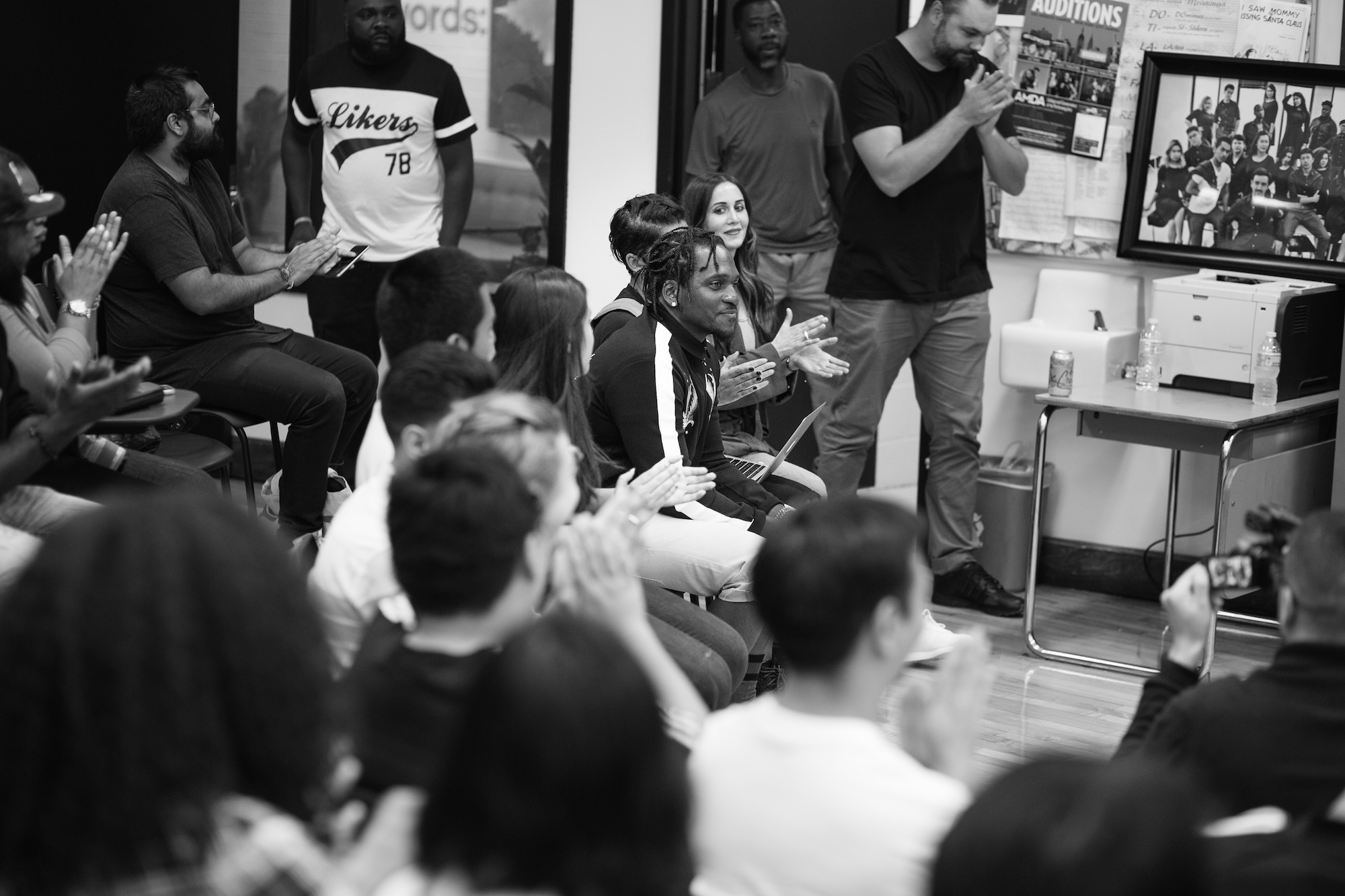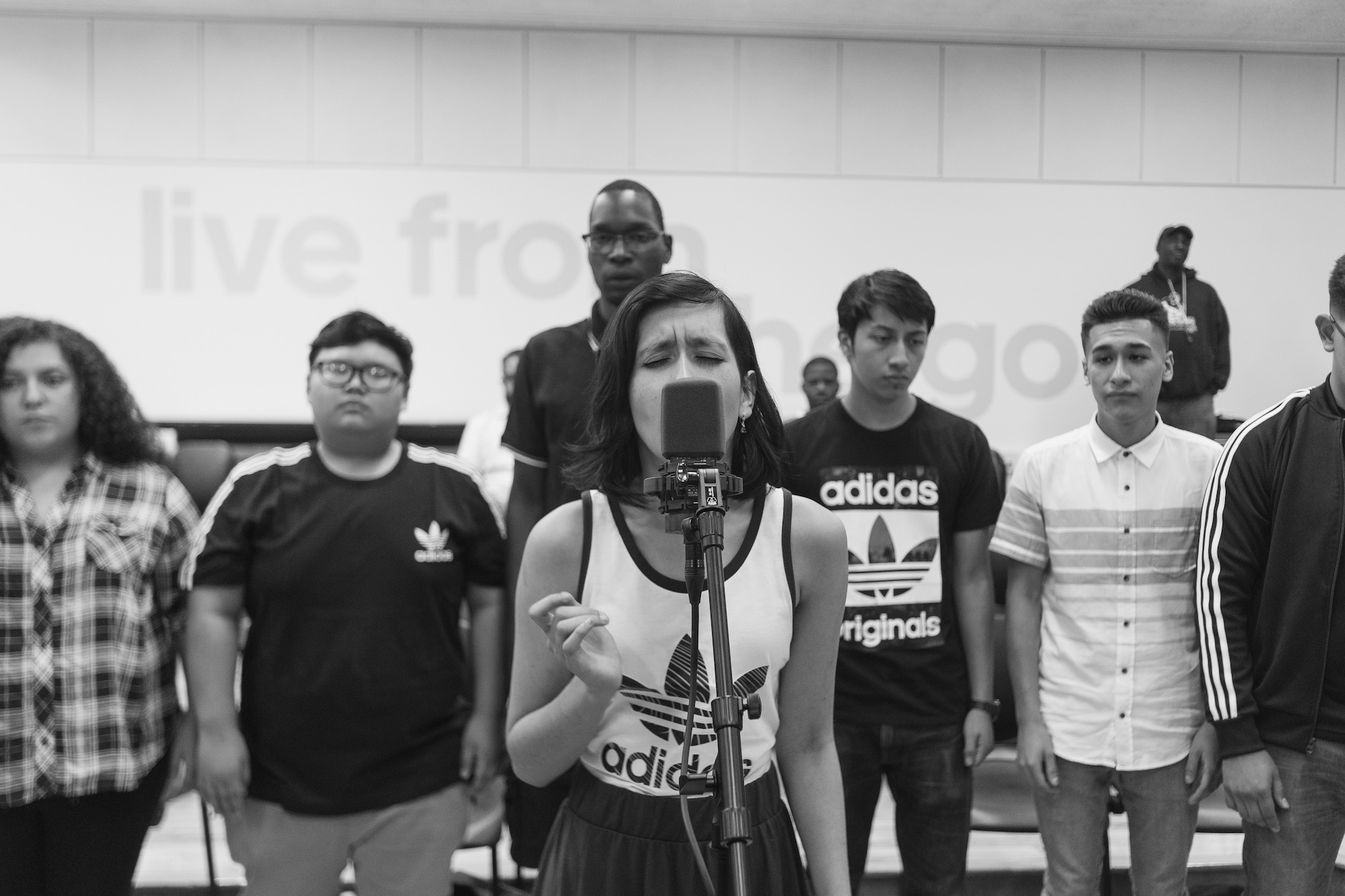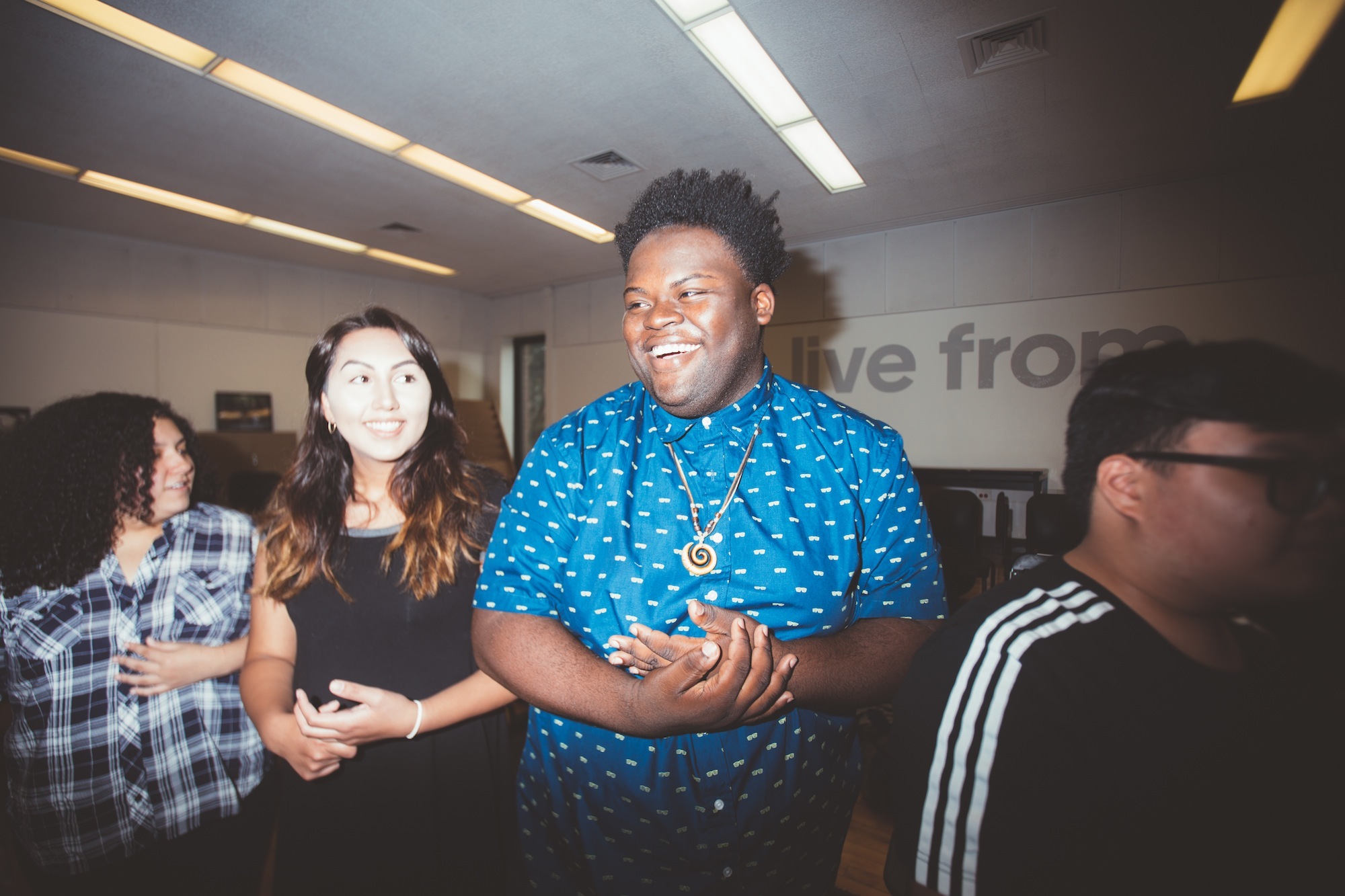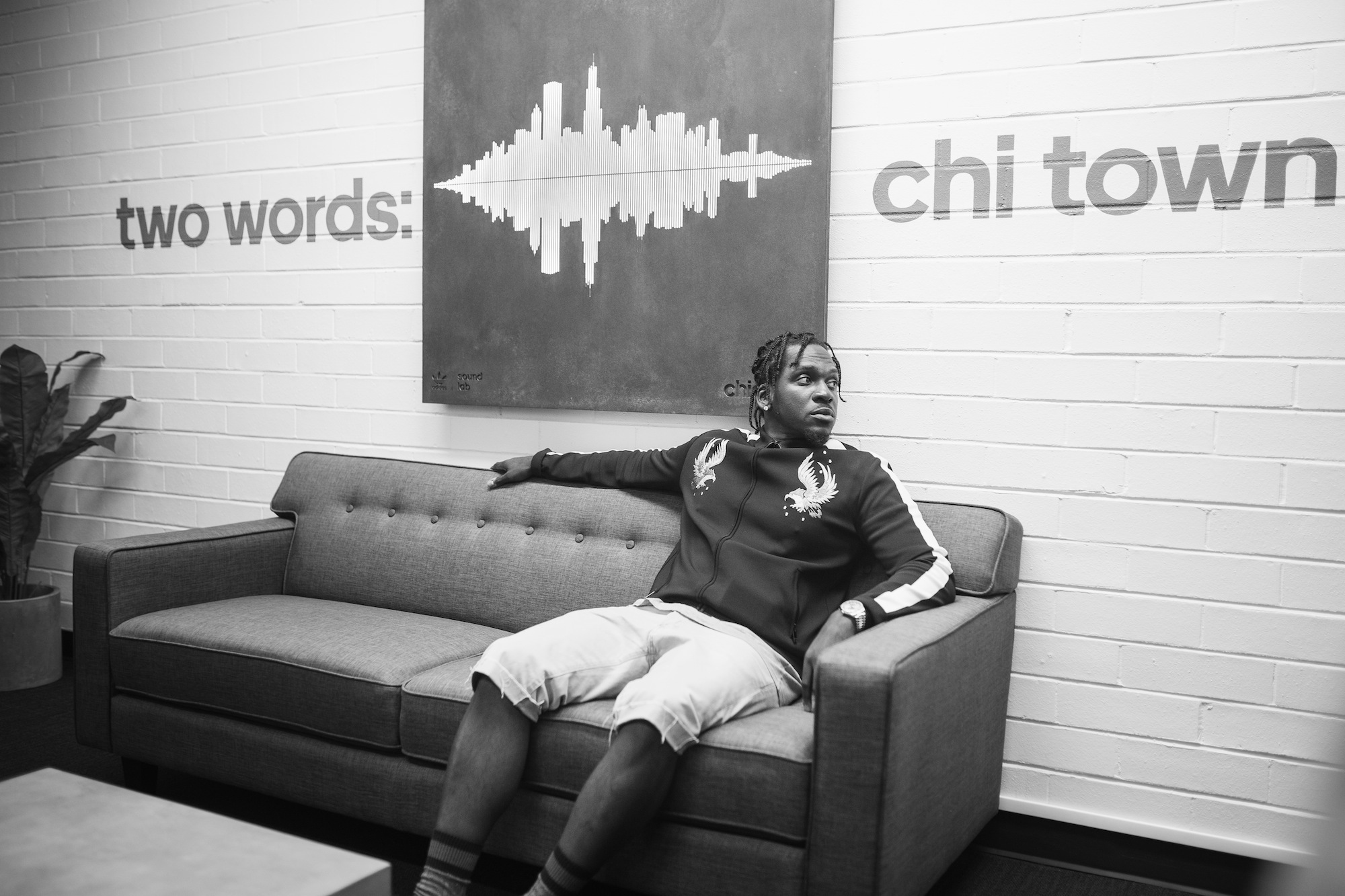Creativity abounds at Marie Sklodowska Curie Metropolitan High School. Student-made artworks spangle the walls of each twisting corridor, between display boxes full of playbills from stage musicals past. A plaque commemorating the Black Eyed Peas’ multi-platinum breakout record Elephunk (a gift from Keith Harris, the Grammy Award-winning producer and Curie alum who’s shaped some of will.i.am and Fergie’s biggest solo and collaborative hits) is displayed proudly toward the school’s main entrance — just beyond the metal detector more than 3,000 students pass through each day.
Curie is a public high school with a Technical and Performing Arts magnet, as well as a competitive International Baccalaureate program. Consequently, its student body is widely varied — a blend of crazy-motivated kids with high test scores and arts-minded creative types. Most of Curie’s students, though, just live in the neighborhood: Archer Heights, a historically Polish-American community in Chicago. It’s located on the city’s South Side, an area that has long been plagued by high murder and crime rates, which have engendered vicious cycles of concentrated poverty and violence. It’s where adidas Originals has chosen to launch the newest iteration of its musical program Sound Labs, with the help of rap icon Pusha T.
“Of course the media sensationalizes and puts a negative spin on things, but the worst of the worst that you hear in the news is true — shootings, danger, gang activity, drugs,” explains Curie’s Assistant Principal Christopher Graves. “Does every student in our school experience that? No. But we know those who do really carry that emotional baggage. We’re thankful to provide everything that we do in the school, but we understand the realities.” One major way Curie supports its students through creative programming. “We’re trying to build an environment that’s hyperfocused on preparing students for college and careers in the arts,” says Graves. “Whether they live on the North Side or in any type of neighborhood — on any side of the spectrum — we want them to think of Curie as that creative hub.”

It’s an ambition well suited to Chicago, a city with rich jazz, blues, and soul roots. Some of today’s most forward-thinking hip-hop artists hail from the South Side: Chance the Rapper, Vic Mensa, Common, and Kanye West among them. Star potential abounds at Curie, too. One of the school’s choral ensembles, Musicality, made it to the semifinals on this season of America’s Got Talent. Yet severe budget cuts to arts programs has made nourishing this wealth of talent a challenge for Curie’s staff and faculty, including Michael Gibson, Musicality’s director. “It’s harder to get instruments, it’s harder to keep pianos tuned. Chicago Public School system cuts present all of these challenges to us,” he says (faced with a lack of practice space, Musicality conducted its daily rehearsals under a stairwell). In response to under-funding, Curie’s impassioned arts faculty has gotten creative about obtaining resources. They’ve established partnerships with cultural institutions across Chicago, including the Museum of Contemporary Arts and Hubbard Street Dance. This drive to invest in the talented youth of tomorrow made Curie a perfect candidate for Sound Labs’ support.
Through the Sound Labs program, fully functional studios — including professional-grade recording and mixing equipment — are installed in public schools that lack proper funding for music departments. Through maintenance of a 2.5 GPA, up to 50 students per academic year gain access to these invaluable resources through an after-school initiative. Like traditional music classes, Sound Labs encourages a culture of self-expression and innovation; but by providing access to such cutting-edge technologies, the program equips students with invaluable real-world audio engineering skills and training.

The inaugural Sound Lab launched last year at Detroit’s Cass Technical High School under the guidance of hometown hero Big Sean. It was met with such enthusiasm (participating Cass students are soon to release their debut album, Infinite Possibilities, on SoundCloud), adidas Originals has expanded the initiative into three cities across the country. In addition to Curie, a new studio is being installed in New York, with more slated to open in 2017. To oversee this growth, adidas enlisted Pusha as Sound Labs’ mentor. As the recently minted President of G.O.O.D Music, he’s in constant communication with creatives across the music industry. But long before he took on the executive role, he rose to the national stage as a sharp-witted lyricist backed by his own tight-knit collaborative community. Push and his older brother Gene (aka Malice) ruled the game as dastardly lyrical duo The Clipse; their earliest sinister street sounds were concocted by childhood pals — Pharrell Williams and Chad Hugo of production masterminds The Neptunes — back in Virginia Beach, a region that Timbaland and Missy Elliott also call home.
“I think the kids of my era were dreamers, huge dreamers. But people in my community never really looked at our success like, ‘we have to cultivate this and push it forward.’ It was more like, ‘these guys are just great,’ and it stopped there,” Push tells me when he arrives in Chicago to meet Curie students face-to-face. “Looking back on it now, I would have thought the community or local government would see people who changed music like Timbaland or The Neptunes and say, ‘This is something we should invest in and help grow.'” Before they’d achieved such success, Push and his peers struggled to get their schools, communities, and families to take their musical ambitions seriously at all. To administrators, kids congregating in the cafeteria to swap rap verses were at best a nuisance, at worst a threat. “We borrowed or rented keyboards and set them up in the house. We skipped school so we could work, because when our parents got home, we had to get out with that noise. Can you imagine if we had a studio to work out of?” Push asks.

Push showed early signs of the laser-focus that’s shaped his illustrious 25-year career. But a lack of accessible resources and positive reinforcement led him to engage in extracurricular activities out on the streets. “It’s very easy to get into things when you have nothing else to do; I’m a prime example of that. I’ve done so many things out of having an abundance of free time and energy, not really focused in one particular direction or feeling like I had to be. That’s the catalyst for anything to go left,” he says. In an area like the South Side — one brimming with talent, but also with avenues towards violence — the Sound Lab gives kids a viable option for building a future. Demonstrating that potential was what drew Push back into high school halls: “I want these kids to understand that the music industry is real, the business is real, and that this is an amazing opportunity that they can turn into whatever they want. Everything that they now have is what makes all of us professional musicians,” he says.
Over the course of his year-long mentorship, Push will periodically visit each Sound Lab to offer career guidance and production assistance to the program’s students. He’ll share insights about creative collaboration and behind-the-scenes team building that are valuable not only to future rhymers. “There are so many aspects of making music, from songwriting to production to engineering, that are all equally important. A program like this in a place like this brings it all together, even beyond the music itself,” he explained. “There’s a management side to the Sound Lab, which is great, because ‘homeboy management’ is the worst mistake you can make in music!” he laughs. “Now, homeboy gets to learn before he steps out into the water. This program is so ideal for creatives; it’s a gift.”

He wasted no time jumping into the mentorship role on Wednesday afternoon, when he addressed a handful of Curie’s students at the Sound Lab’s grand opening, and helped them break in their brand new studio. First up to the mic, naturally, was Musicality. The ensemble includes singers of all skin tones, shapes, sizes, socio-economic backgrounds, and vocal ranges — a reflection of the diversity that makes Chicago such a dynamic city, and Curie such an exciting educational environment. The group shattered a performance of Lady Gaga’s “Born this Way,” while King Push held court. He listened intently as one student hopped into the booth to deliver a re-mixed rendition of recent G.O.O.D signee Desiigner’s menacing mega-viral single “Timmy Turner” (in his version, the titular Nickelodeon character was replaced with another, Jimmy Neutron). Push’s ears noticeably perked up when a quiet student inaugurated the Sound Labs’ mixer, debuting a darkly cinematic beat of his own making.
Asst. Principal Graves is adamant that kids who have yet to express the same eagerness as these musically-motivated students will benefit from the program, too. “We predict really only 15% of our students are arts-passionate; the other 85% are either willing to try, or resistant,” he explains. “The goal with any of those kids is to open their minds, build some intrinsic motivation or lifelong passion. I think of my own childhood; my parents don’t have careers in the arts, but I went to sleep every night with my dad playing the piano. That inspired me, in some way, to become a music teacher. If our kids grow into adults that enjoy music, maybe they’ll raise children who are appreciative of the arts, supportive of the arts, and help provide arts funding. The Sound Lab is another opportunity for our students to express, or in some cases discover, their passion.”
Push is equally excited about the unexpected new ideas Sound Labs will inspire among all kinds of students. “Anytime you invest in a kid and give him an outlet, man, nine times out of ten you’re gonna come out with greatness, and at the very least, a new idea. There’s nothing wrong with any of those two outcomes,” he says. “You keep kids working toward something, anything, and they’ll find their way.”

Credits
Text Emily Manning
Photography courtesy Sam Trotter
